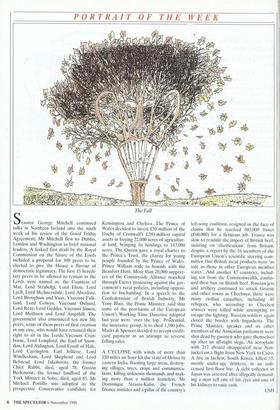PORTRAIT OF THE WEEK
The Fall
Senator George Mitchell continued talks in Northern Ireland into the ninth week of his review of the Good Friday Agreement; Mr Mitchell flew to Dublin, London and Washington to brief national leaders. A leaked first draft by the Royal Commission on the future of the Lords included a proposal for 100 peers to be elected to give the House a flavour of democratic legitimacy. The first 15 heredi- tary peers to be allowed to remain in the Lords were named as: the Countess of Mar, Lord Strabolgi, Lord Elton, Lord Lyell, Lord Skelmersdale, Lord Aberdare, Lord Brougham and Vaux, Viscount Falk- land, Lord Colwyn, Viscount Oxfuird, Lord Reay, Lord Geddes, Viscount Simon, Lord Methuen and Lord Ampthill. The government also announced ten new life peers, some of them peers of first creation in any case, who would have retained their right to sit in the Lords: Viscount Cran- borne, Lord Longford, the Earl of Snow- don, Lord Aldington, Lord Erroll of Hale,. Lord Carrington, Earl Jellicoe, Lord Windlesham, Lord Shepherd and Lord Belstead. Lord Jakobovits, the former Chief Rabbi, died, aged 78. Gaston Berlemont, the former landlord of the York Minster in Soho, died, aged 85. Mr Michael Portillo was adopted as the prospective Conservative candidate for
Kensington and Chelsea. The Prince of Wales decided to invest £50 million of the Duchy of Cornwall's £280-million capital assets in buying 22,000 acres of agricultur- al land, bringing its holdings to 147,000 acres. The Queen gave a royal charter to the Prince's Trust, the charity for young people founded by the Prince of Wales. Prince William rode to hounds with the Beaufort Hunt. More than 20,000 support- ers of the Countryside Alliance marched through Exeter protesting against the gov- ernment's rural policies, including opposi- tion to fox-hunting. In a speech to the Confederation of British Industry, Mr Tony Blair, the Prime Minister, said that some of the provisions of the European Union's Working Time Directive adopted last year were 'over the top'. Priklential, the insurance group, is to shed 1,500 jobs. Marks & Spencer decided to accept credit- card payment in an attempt to reverse falling sales.
A CYCLONE with winds of more than 150 miles an hour hit the state of Orissa in eastern India, flooding large areas, destroy- ing villages, trees, crops and communica- tions, killing unknown thousands and mak- ing more than a million homeless. Mr Dominique Strauss-Kahn, the French finance minister and a pillar of the country's left-wing coalition, resigned in the face of claims that he received 603,000 francs (£60,000) for a fictitious job. France was slow to readmit the import of British beef, insisting on 'clarifications' from Britain, despite a report by the 16 members of the European Union's scientific steering com- mittee that British meat products were 'as safe as those in other European member states'. And another 47 countries, includ- ing ten from the Commonwealth, contin- ued their ban on British beef. Russian jets and artillery continued to attack Grozny and other towns in Chechnya; there were many civilian casualties, including 40 refugees, who according to Chechcn sources were killed while attempting to escape the fighting. Russian soldiers again closed the border with Ingushetia. The Prime Minister, speaker and six other members of the Armenian parliament were shot dead by gunmen who gave themselves up after an all-night siege. An aeroplane with 217 aboard disappeared near Nan- tucket on a flight from New York to Cairo. A fire in Inchon, South Korea, killed 55, mostly under-age drinkers, in an unli- censed first-floor bar. A debt collector in Japan was arrested after allegedly demand- ing a man sell one of his eyes and one of his kidneys to raise cash.
CSH


























































































 Previous page
Previous page